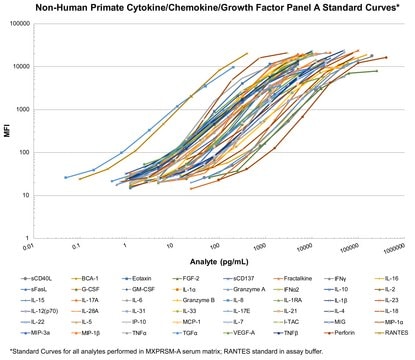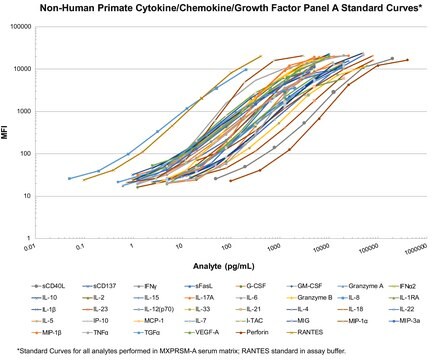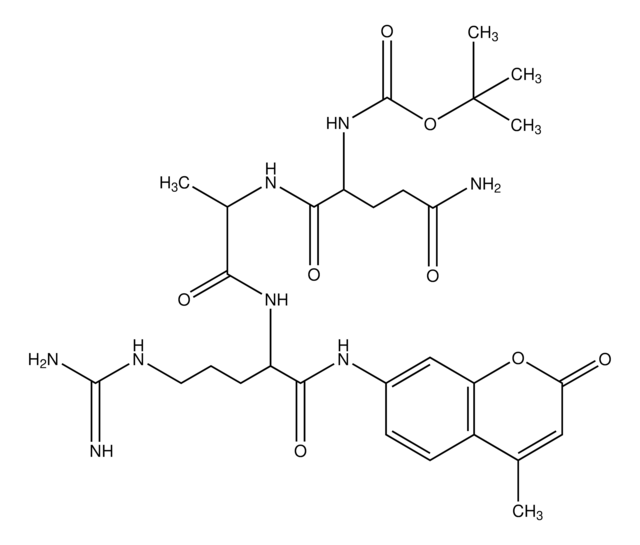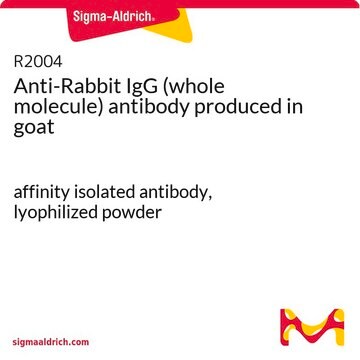PF078
Heparin Binding Epidermal Growth Factor, Human, Recombinant, S. frugiperda
Sinónimos:
HB-EGF
Iniciar sesiónpara Ver la Fijación de precios por contrato y de la organización
About This Item
Código UNSPSC:
12352202
Productos recomendados
Análisis
≥97% (SDS-PAGE)
Nivel de calidad
formulario
solid
fabricante / nombre comercial
Calbiochem®
condiciones de almacenamiento
OK to freeze
avoid repeated freeze/thaw cycles
impurezas
≤1 EU/μg Endotoxins (EU/μg cytokine)
Condiciones de envío
wet ice
temp. de almacenamiento
−20°C
Descripción general
Recombinant, human heparin binding epidermal growth factor expressed in S. frugiperda insect cells. The mature HB-EGF is a human recombinant protein whose DNA sequence encoding the N-terminal 148 amino acid residues of human HB-EGF precursor was expressed in Sf 21 insect cells using a baculovirus expression system. The mature recombinant protein (86 amino acids) generated by the removal of the 62 amino acid residue signal and propeptide has a predicted molecular mass of ~9.5 kDa. The recombinant protein is heterogeneously O-glycosylated and migrates as an ~12 kDa protein in SDS-PAGE. Heparin-binding epidermal growth factor-like growth factor (HB-EGF) is a ~22 kDa O-glycosylated protein that is a potent mitogen and chemoattractant for vascular smooth muscle cells, fibroblasts, and epithelial cells but not endothelial cells. The natural protein has an apparent molecular mass of ~19-23 kDa and exists in multiple forms as a result of heterogeneous O-glycosylation and/or N-terminal truncation. HB-EGF is synthesized as a membrane-anchored precursor (proHB-EGF) that is proteolytically cleaved to release the soluble mature growth factor. The two forms are active as juxtacrine and paracrine/autocrine growth factors respectively. Recent studies show MMP-3 as one of the enzymes that cleaves HB-EGF implicating a role for MMP-3 in the regulation of HB-EGF from being a juxtacrine to a paracrine/autocrine factor. HB-EGF activates two EGF receptor subtypes, HER1/ErbB1, and HER4 and binds to heparan sulfate proteoglycan. The proHB-EGF is postulated as the high affinity receptor for diphtheria toxin (DT). Recent evidence suggests that the coexpression of proHB-EGF and CD9 on macrophages may strongly promote the development of atherosclerosis by a juxtacrine mechanism. Transcription of HB-EGF can be induced in vascular endothelial cells as well as aortic smooth muscle cells which may also play an important role in the pathogenesis of atherosclerosis. Useful for proliferation studies.
Recombinant, human heparin binding epidermal growth factor expressed in S. frugiperda insect cells. The mature HB-EGF is generated by the removal of the 62 amino acid (~9.5 kDa) signal. Protein is heterogeneously O-glycosylated and migrates as an ~12 kDa protein in SDS-PAGE. Titrate the protein for optimal results in individual systems.
Acciones bioquímicas o fisiológicas
EC₅₀ of 2-5 ng/ml as measured by its ability to stimulate ³H-thymidine incorporation in the EGF-responsive fibroblast cell line, Balb/3T3
Advertencia
Toxicity: Standard Handling (A)
Forma física
Lyophilized from a sterile-filtered PBS solution, 50 µg of BSA/µg of cytokine, pH 7.4.
Reconstitución
Reconstitute in PBS to ≥1 µg/ml containing ≥0.1%HSA or BSA.
Otras notas
Davis-Fleischer, K.M. and Besner, G.E. 1998. Front. Biosci.3, D288.
Ouchi, N., et al. 1997. Biochem. J.328, 923.
Raab, G. and Klagsbrun, M. 1997. Biochim. Biophys. Acta1333, F179.
Suzuki, M., et al. 1997. J. Biol. Chem.272, 31730.
Nakata, A., et al. 1996. Circulation94, 2778.
Miyagawa, J., et al. 1995. J. Clin. Invest.95, 404.
Higashiyama, S., et al. 1991. Science251, 936.
Ouchi, N., et al. 1997. Biochem. J.328, 923.
Raab, G. and Klagsbrun, M. 1997. Biochim. Biophys. Acta1333, F179.
Suzuki, M., et al. 1997. J. Biol. Chem.272, 31730.
Nakata, A., et al. 1996. Circulation94, 2778.
Miyagawa, J., et al. 1995. J. Clin. Invest.95, 404.
Higashiyama, S., et al. 1991. Science251, 936.
Información legal
CALBIOCHEM is a registered trademark of Merck KGaA, Darmstadt, Germany
Código de clase de almacenamiento
11 - Combustible Solids
Clase de riesgo para el agua (WGK)
WGK 3
Certificados de análisis (COA)
Busque Certificados de análisis (COA) introduciendo el número de lote del producto. Los números de lote se encuentran en la etiqueta del producto después de las palabras «Lot» o «Batch»
¿Ya tiene este producto?
Encuentre la documentación para los productos que ha comprado recientemente en la Biblioteca de documentos.
Michael A Tolino et al.
Biochimica et biophysica acta, 1810(9), 875-878 (2011-06-07)
Heparin-binding EGF-like growth factor (HB-EGF) contains, in contrast to EGF, a domain that binds to negatively charged glycans on cell surfaces and in extracellular matrix. We speculated that a short exposure to HB-EGF induces prolonged biological effects such as healing
Nuestro equipo de científicos tiene experiencia en todas las áreas de investigación: Ciencias de la vida, Ciencia de los materiales, Síntesis química, Cromatografía, Analítica y muchas otras.
Póngase en contacto con el Servicio técnico







